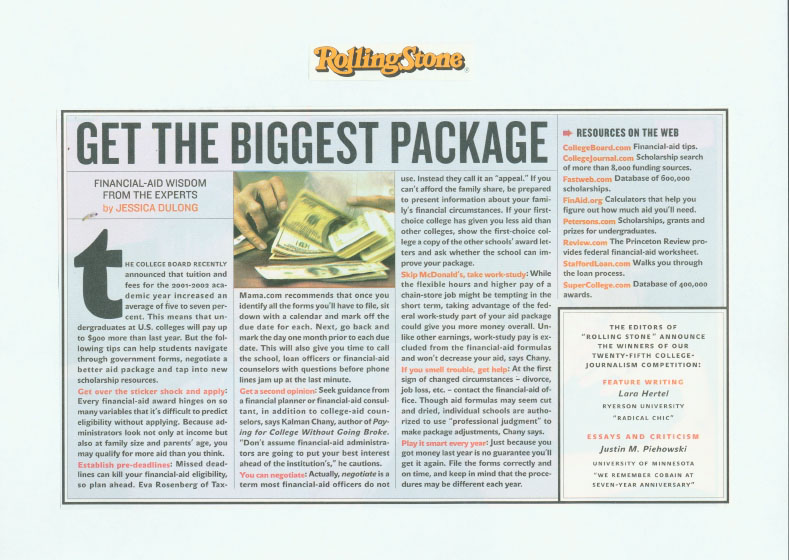Financial Aid Wisdom From the Experts
The College Board recently announced that tuition and fees for the 2001-2002 academic year increased an average of five to seven percent. This means that undergraduates at U.S. colleges will pay up to $900 more than last year. But the following tips can help students navigate through government forms, negotiate a better aid package and tap into new scholarship resources.
Get over the sticker shock and apply:
Every financial-aid award hinges on so many variables that it’s difficult to predict eligibility without applying. Because administrators look not only at income but also at family size and parents’ age, you may qualify for more aid than you think.
Establish pre-deadlines:
Missed deadlines can kill your financial-aid eligibility, so plan ahead. Eva Rosenberg of TaxMama.com recommends that once you identify all the forms you’ll have to file, sit down with a calendar and mark off the due date for each. Next, go back and mark the day one month prior to each due date. This will also give you time to call the school, loan officers or financial-aid counselors with questions before phone lines jam up at the last minute.
Get a second opinion:
Seek guidance from a financial planner or financial-aid consultant, in addition to college-aid counselors, says Kalman Chany, author of Paying for College Without Going Broke. “Don’t assume financial-aid administrators are going to put your best interest ahead of the institution’s,” he cautions.
You can negotiate:
Actually, ‘negotiate’ is a term most financial-aid officers do not use. Instead they call it an “appeal.” If you can’t afford the family share, be prepared to present information about your family circumstances. If your first-choice college has given you less aid than other colleges, show the first-choice college a copy of the other schools’ award letters and ask whether the school can improve your package.
Skip McDonald’s, take work-study:
While the flexible hours and higher pay of a chain-store job might be tempting in the short term, taking advantage of the federal work-study part of your aid package could give you more money overall. Unlike other earnings, work-study pay is excluded from the financial-aid formulas and won’t decrease your aid, says Chany.
If you smell trouble, get help:
At the first sign of changed circumstances – divorce, job loss, etc. – contact the financial-aid office. Though aid formulas may seem cut and dried, individual schools are authorized to use “professional judgment” to make package adjustments, Chany says.
Play it smart every year:
Just because you got money last year is no guarantee you’ll get it again. File the forms correctly and on time, and keep in mind that the proce-dures may be different each year.

Resources on the Web:
CollegeBoard.com: Financial-aid tips
CollegeJournal.com: Scholarship Search of more then 8,000 funding sources
Fastweb.com: Database of 600,000 scholarships
FinAid.org: Calculators that help you figure out how much aid you’ll need
Petersons.com: Scholarships, grants and prizes for undergraduates
Review.com: The Princeton Review provides a federal financial-aid worksheet
StaffordLoan.com: Walks you through the loan process
SuperCollege.com: Database of 400,000 awards

